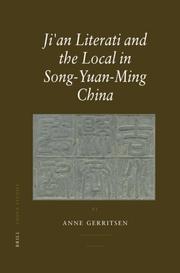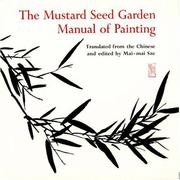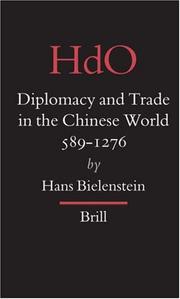| Listing 1 - 8 of 8 |
Sort by
|
Book
ISBN: 0231552416 9780231552417 9780231197922 9780231197939 Year: 2021 Publisher: New York, NY
Abstract | Keywords | Export | Availability | Bookmark
 Loading...
Loading...Choose an application
- Reference Manager
- EndNote
- RefWorks (Direct export to RefWorks)
Top Graduate Zhang Xie is the first extant play in the Chinese southern dramatic tradition and a milestone in the history of Chinese literature. Dating from the early fifteenth century, but possibly composed earlier, it is the work of a writing club called the Nine Mountain Society.The play relates the story of a talented scholar who sets off for the capital to take the imperial exams. On the road, he is robbed and beaten by a bandit. In a nearby village temple he meets an orphaned girl who nurses him back to health and whom he marries. Once he takes first place in the exams, however, he comes to regret the marriage, setting in motion a series of decisions with disastrous consequences for both of them.Underlying this story of love, ambition, and betrayal are tensions created by the expectations that family, society, and state placed on the scholar. The examination system offered families the promise of social and economic advancement through an official position. The state relied on these men for the administration of the empire, and society expected that education in the classics would produce moral men. The play offers a critique of the scholar’s ideal, the education system, and the ethical values this process was intended to instill.This first full English-language translation of Top Graduate Zhang Xie features a detailed introduction that discusses the foundations of Chinese drama and the play’s composition and performance.
Song Dynasty (China) --- Chinese drama. --- Chinese drama --- Chinese literature
Book
ISBN: 9048561221 Year: 2022 Publisher: Amsterdam Amsterdam University Press
Abstract | Keywords | Export | Availability | Bookmark
 Loading...
Loading...Choose an application
- Reference Manager
- EndNote
- RefWorks (Direct export to RefWorks)
In the eleventh century, the cities of the Song Empire (960-1279) emerged into writing. Literati in prior centuries had looked away from crowded streets, but literati in the eleventh century found beauty in towering buildings and busy harbors. Their purpose in writing the city was ideological. On the written page, they tried to establish a distinction that eluded them in the avenues and to discern an immanent pattern in the movement of people, goods, and money. By the end of the eleventh century, however, they recognized that they had failed in their efforts. They had lost the Way in the city. Urban Life and Intellectual Crisis in Middle-Period China, 800-1100 reveals the central place of urban life in the history of the eleventh century. Important developments in literary innovation and monetary policy, in canonical exegesis and civil engineering, in financial reform and public health, converge in this book as they converged in the city.
Book
Year: 2022 Publisher: Amsterdam Amsterdam University Press
Abstract | Keywords | Export | Availability | Bookmark
 Loading...
Loading...Choose an application
- Reference Manager
- EndNote
- RefWorks (Direct export to RefWorks)
In the eleventh century, the cities of the Song Empire (960-1279) emerged into writing. Literati in prior centuries had looked away from crowded streets, but literati in the eleventh century found beauty in towering buildings and busy harbors. Their purpose in writing the city was ideological. On the written page, they tried to establish a distinction that eluded them in the avenues and to discern an immanent pattern in the movement of people, goods, and money. By the end of the eleventh century, however, they recognized that they had failed in their efforts. They had lost the Way in the city. Urban Life and Intellectual Crisis in Middle-Period China, 800-1100 reveals the central place of urban life in the history of the eleventh century. Important developments in literary innovation and monetary policy, in canonical exegesis and civil engineering, in financial reform and public health, converge in this book as they converged in the city.

ISBN: 9789004156036 9004156038 9786611917272 1281917273 9047419537 9789047419532 9781281917270 6611917276 Year: 2007 Volume: 13 Publisher: Leiden Boston Biggleswade Brill Extenza Turpin [distributor]
Abstract | Keywords | Export | Availability | Bookmark
 Loading...
Loading...Choose an application
- Reference Manager
- EndNote
- RefWorks (Direct export to RefWorks)
Drawing on largely local sources, including local gazetteers and literati inscriptions for religious sites, this book offers a comprehensive examination of what it means to be 'local' during the Southern Song, Yuan and Ming dynasties in Ji'an prefecture (Jiangxi). It argues that 'belonging locally' was important to Ji'an literati throughout this period. How they achieved that, however, changed significantly. Southern Song and Yuan literati wrote about religious sites from within their local communities, but their early Ming counterparts wrote about local temples from their posts at the capital, seeking to transform local sites from a distance. By the late Ming, temples had been superseded by other sites of local activism, including community compacts, lineage prefaces, and community covenants.
S02/0200 --- China: General works--Civilization and culture --- China --- History --- China -- History -- Ming dynasty, 1368-1644. --- China -- History -- Song dynasty, 960-1279. --- China -- History -- Yuan dynasty, 1260-1368. --- East Asia --- Regions & Countries - Asia & the Middle East --- History & Archaeology
Book
ISBN: 0520959752 9780520959750 9780520284067 0520284062 9780520284074 0520284070 Year: 2016 Publisher: Oakland, California
Abstract | Keywords | Export | Availability | Bookmark
 Loading...
Loading...Choose an application
- Reference Manager
- EndNote
- RefWorks (Direct export to RefWorks)
The truth of Chan Buddhism-better known as "Zen"-is regularly said to be beyond language, and yet Chan authors-medieval and modern-produced an enormous quantity of literature over the centuries. To make sense of this well-known paradox, Patriarchs on Paper explores several genres of Chan literature that appeared during the Tang and Song dynasties (c. 600-1300), including genealogies, biographies, dialogues, poems, monastic handbooks, and koans. Working through this diverse body of literature, Alan Cole details how Chan authors developed several strategies to evoke images of a perfect Buddhism in which wonderfully simple masters transmitted Buddhism's final truth to one another, suddenly and easily, and, of course, independent of literature and the complexities of the Buddhist monastic system. Chan literature, then, reveled in staging delightful images of a Buddhism free of Buddhism, tempting the reader, over and over, with the possibility of finding behind the thick façade of real Buddhism-with all its rules, texts, doctrines, and institutional solidity-an ethereal world of pure spirit. Patriarchs on Paper charts the emergence of this kind of "fantasy Buddhism" and details how it interacted with more traditional forms of Chinese Buddhism in order to show how Chan's illustrious ancestors were created in literature in order to further a wide range of real-world agendas.
Zen literature, Chinese --- Zen Buddhism --- Chinese Zen literature --- Chinese literature --- Chʻan Buddhism --- Dhyāna (Sect) --- Zen --- Zen (Sect) --- Buddhism --- Mahayana Buddhism --- History and criticism. --- History of doctrines --- Zen literature, Chinese - China - History and criticism. --- Zen Buddhism - History of doctrines - Middle Ages, 600-1500. --- buddha. --- buddhism. --- chan buddhism. --- chan literature. --- chan. --- chinese buddhism. --- cultural studies. --- eastern culture. --- fantasy buddhism. --- final truth. --- huineng. --- institutional solidarity. --- jingjue. --- koans. --- literary tradition. --- medieval writers. --- modern writers. --- monastic handbooks. --- monastic system. --- perfect buddhism. --- poems. --- pure spirit. --- religion. --- religious doctrines. --- religious history. --- religious literature. --- religious studies. --- shenhui. --- song dynasty. --- spiritual. --- tang dynasty. --- zen philosophy. --- zen.
Book
ISBN: 9789004192287 900419228X 9786613120427 9004193863 1283120429 9789004193864 9781283120425 Year: 2011 Volume: 100 Publisher: Leiden Boston Brill
Abstract | Keywords | Export | Availability | Bookmark
 Loading...
Loading...Choose an application
- Reference Manager
- EndNote
- RefWorks (Direct export to RefWorks)
The essays in this volume seek to flesh out the diversity of Chinese textual production during the period spanning the tenth and fourteenth centuries when printing became a widely used technology. By exploring the social and political relations that shaped the production and reproduction of printed texts, the impact of intellectual and religious formations on book production, the interaction between print and other media, readership, and the growth of collections, the contributors offer the first comprehensive examination of the cultural history of book production in the first 500 years of the history of printing. In an afterword historian of the early modern European book, Ann Blair, reflects on the volume's implications for the comparative study of the impact of printing.
Printing
---
Books
---
Block books, Chinese
---
History
---
China
---
Block books, Chinese - History.
---
Block books, Chinese -- History -- Congresses.
---
Books - China - History - 400-1450.
---
Books -- China -- History -- 400-1450 -- Congresses.
---
China - History - Song dynasty, 960-1279.
---
China -- History -- Song dynasty, 960-1279 -- Congresses.
---
China - History - Yuan dynasty, 1260-1368.
---
China -- History -- Yuan dynasty, 1260-1368 -- Congresses.
---
Printing - China - History - To 1500.
---
Printing -- China -- History -- To 1500 -- Congresses.
---
Education
---
Social Sciences
---
Book Studies & Arts
---
S01/0600
---
094.1 <51>
---
655 <09>
---
094 =951
---
China: Bibliography and reference--Books, printing, editing and paper
---
Oude drukken: bibliografie--

ISBN: 0691099405 1400866839 9781400866830 0691018197 9780691018195 9780691099408 Year: 2015 Publisher: Princeton, NJ
Abstract | Keywords | Export | Availability | Bookmark
 Loading...
Loading...Choose an application
- Reference Manager
- EndNote
- RefWorks (Direct export to RefWorks)
Originally published as Volume 2 of The Tao of Painting, this is the first English translation of the famous Chinese handbook, the "Chieh Tzu Yüan Hua Chuan" (original, 1679-1701). Mai-mai Sze has translated and annotated the texts of instructions, discussions of the fundamentals of painting, notes on the preparation of colors, and chief editorial prefaces.
Painting --- Painting, Chinese --- Technique --- Painting, Chinese. --- Painters --- Chinese painting --- Paintings, Chinese --- Technique. --- S17/0600 --- China: Art and archaeology--Calligraphy and painting: general (incl. technic. and esthetic aspects) --- Painting - Technique --- A Book Of. --- Analects. --- Apricot. --- B.C. (comic strip). --- Bamboo painting. --- Bamboo shoot. --- Bamboo. --- Banksia. --- Begonia. --- Blue flower. --- Brushstrokes. --- Buddhism. --- Calligraphy. --- Camellia. --- Cedrela odorata. --- Chih. --- Chinese painting. --- Chrysanthemum. --- Cinnabar. --- Copying. --- Dyeing. --- Earthenware. --- Earwax. --- Eggplant. --- Engraving. --- Figure painting. --- Fine art. --- Firewood. --- Flowering plant. --- Flowers of the Four Seasons. --- Fungus. --- Gold leaf. --- Gourd. --- Han Yu. --- Herb. --- Herbaceous plant. --- Hydrangea. --- Illustration. --- In Parenthesis. --- Ink wash painting. --- Inkstone. --- La Vie (painting). --- Landscape painting. --- Li Tai. --- Literature. --- Lithography. --- Malachite. --- Materia medica. --- Medicinal plants. --- Monochrome painting. --- Mr. --- Mustard seed. --- Ochre. --- Oil lamp. --- Orange (colour). --- Peach. --- Peony. --- Perennial plant. --- Petal. --- Philadelphia Museum of Art. --- Picturesque. --- Pigment. --- Pink. --- Plant. --- Poaceae. --- Poetry. --- Polianthes tuberosa. --- Pomegranate. --- Porcelain. --- Prunus mume. --- Receptacle (botany). --- Saucer. --- Shan shui. --- Shrub. --- Song dynasty. --- Southern School. --- Stamen. --- Sterculia. --- Still Water (sculpture). --- Sulfur. --- Superiority (short story). --- Tang dynasty. --- Tao Te Ching. --- Tea. --- Testimonial. --- The Art of Painting. --- The Fundamentals. --- The Summer Solstice. --- Theory of painting. --- Treatise. --- Tree paint. --- Tree peony. --- Vinegar. --- Water chestnut. --- Wild plum. --- Wilting. --- Wood block. --- Writing. --- Yin and yang. --- Zhuge Liang.

ISBN: 9004144161 9786610868179 1429455209 904740761X 1280868171 1433707004 9781429455206 9781433707001 9789004144163 9789047407614 Year: 2005 Volume: 18 Publisher: Leiden Brill
Abstract | Keywords | Export | Availability | Bookmark
 Loading...
Loading...Choose an application
- Reference Manager
- EndNote
- RefWorks (Direct export to RefWorks)
Covering the period from the establishment of Sui to the fall of Southern Sung, this reference work for the first time gives a full and conveniently arrranged overview of China’s diplomatic and trade relations with its major and minor Asian neighbours: continental South Asia and the islands, Japan, Korea, Northeast Asia, Tibet, Central Asia, West Asia, the Middle East, and the Hsia, Liao, and Chin States. Basing himself on his yearlong research of Chinese official histories and historical compendia, the author offers a wealth of detailed information - in translation - on matters such as the goods exchanged, the negotiations for peace and alliances, special missions required by diplomatic etiquette, foreign requests for marriage with Chinese princesses, et cetera Special emphasis is given to the meaning of the so-called “tribute missions”, in reality a disguised form of trade.
China --- Chine --- Commerce --- History. --- Foreign relations --- History --- Histoire --- Relations extérieures --- China - Commerce - History. --- S09/0400 --- S09/0200 --- S04/0600 --- S09/0410 --- #SML: Chinese memorial library --- China: Foreign relations and world politics--China and Asia: general --- China: Foreign relations and world politics--General works and before 1840 --- China: History--Dynasties: 220 - 1840 --- China: Foreign relations and world politics--Relations with Asian countries --- Relations extérieures --- Commerce. --- Diplomatic relations. --- Song Dynasty (China) --- Tang Dynasty (China) --- Diplomatieke betrekkingen. --- Buitenlandse handel. --- Trade --- Economics --- Business --- Transportation --- Relations --- Cina --- Kinë --- Cathay --- Chinese National Government --- Chung-kuo kuo min cheng fu --- Republic of China (1912-1949) --- Kuo min cheng fu (China : 1912-1949) --- Chung-hua min kuo (1912-1949) --- Kina (China) --- National Government (1912-1949) --- China (Republic : 1912-1949) --- People's Republic of China --- Chinese People's Republic --- Chung-hua jen min kung ho kuo --- Central People's Government of Communist China --- Chung yang jen min cheng fu --- Chung-hua chung yang jen min kung ho kuo --- Central Government of the People's Republic of China --- Zhonghua Renmin Gongheguo --- Zhong hua ren min gong he guo --- Kitaĭskai︠a︡ Narodnai︠a︡ Respublika --- Činská lidová republika --- RRT --- Republik Rakjat Tiongkok --- KNR --- Kytaĭsʹka Narodna Respublika --- Jumhūriyat al-Ṣīn al-Shaʻbīyah --- RRC --- Kitaĭ --- Kínai Népköztársaság --- Chūka Jinmin Kyōwakoku --- Erets Sin --- Sin --- Sāthāranarat Prachāchon Čhīn --- P.R. China --- PR China --- Chung-kuo --- Zhongguo --- Zhonghuaminguo (1912-1949) --- Zhong guo --- République Populaire de Chine --- República Popular China --- Catay --- VR China --- VRChina --- 中國 --- 中国 --- 中华人民共和国 --- Jhongguó --- Bu̇gu̇de Nayiramdaxu Dundadu Arad Ulus --- Bu̇gu̇de Nayiramdaqu Dumdadu Arad Ulus --- Bu̇gd Naĭramdakh Dundad Ard Uls --- Khi︠a︡tad --- Kitad --- Dumdadu Ulus --- Dumdad Uls --- Думдад Улс --- Kitajska --- China (Republic : 1949- ) --- PRC --- P.R.C. --- BNKhAU --- БНХАУ
| Listing 1 - 8 of 8 |
Sort by
|

 Search
Search Feedback
Feedback About UniCat
About UniCat  Help
Help News
News